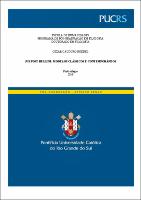| Share record |


|
Please use this identifier to cite or link to this item:
https://tede2.pucrs.br/tede2/handle/tede/9017| Document type: | Tese |
| Title: | Jus post bellum : modelos clássicos e contemporâneos |
| Author: | Roedel, Cezar Cauduro  |
| Advisor: | Pich, Roberto Hofmeister |
| Abstract (native): | A tradição doutrinária da Teoria da Guerra Justa (TGJ) parece ter assentado as balizas morais e jurídicas do direito à guerra (Jus ad bellum) e da própria forma de condução de um conflito (Jus in bello). Todavia, recentes são as pesquisas que visam dar entendimento ao complexo fenômeno da terminação dos conflitos e os princípios morais e jurídicos atinentes ao mesmo; o que veio a ser denominado como Jus post bellum (JPB). A presente pesquisa está circunscrita ao fenômeno do JPB e busca, em primeiro, refletir sobre o mesmo, seus princípios e elementos contemporâneos, explorando na visão de pesquisadores da atualidade a discussão de um toolkit mais adequado à terminação das guerras. Em um segundo momento, aprofundamos a concepção do JPB na escolástica tardia, nas obras de Francisco de Vitoria (1483–1546) e Francisco Suárez (1548–1617) – identificando seus modelos para a terminação dos conflitos. Em terceiro, vislumbramos analisar a junção do pensamento escolástico à visão sistemática de Hugo Grotius (1583–1645), buscando os elementos inovadores emergentes em sua obra. Ao cotejar as pesquisas recentes acerca do JPB, com a tradição escolástica e com o esforço de Grotius, a pesquisa levantará, por último, uma contraposição dos modelos de JPB à luz do mais recente debate entre os teóricos e pesquisadores do tema, que os dividiu em minimalistas e maximalistas. Nosso objetivo principal inclina-se ao cotejamento dos modelos clássicos e contemporâneos, buscando neles o melhor ajuste à terminação dos conflitos. |
| Abstract (english): | The doctrinal tradition of Just War Theory (JWT) seems to have laid the moral and juridical beacons of the right to war (Jus ad bellum) and the appropriate form of conducting a conflict (Jus in bello). However, recent research is aimed at understanding the complex phenomenon of conflict termination and its moral and legal standards; what came to be named as Jus post bellum (JPB). This research is limited to the phenomenon of JPB and seeks, first, to reflect on it, its principles and contemporary elements, exploring in the view of current researchers the discussion of a most appropriate toolkit at the end of a war. In a second moment, we deepen the conception of JPB in late scholasticism, in the works of Francisco de Vitoria (1483–1546) and Francisco Suárez (1548–1617) – identifying their models for the ending of conflicts. Third, we envision analyzing the junction of scholastic thinking with the systematic view of Hugo Grotius (1583–1645), seeking the innovative elements emerging in his work. By comparing recent research on JPB, with the scholastic tradition and Grotius's efforts, the research will finally raise a counterpoint to JPB's models linked of the latest debate among theorists and researchers on the subject, which has divided them in minimalist and maximalist visions. Our main objective is to compare classic and contemporary models of JPB, seeking in them the best adjustment to the ending of conflicts. |
| Keywords: | Jus Post Bellum Francisco de Vitoria Francisco Suárez Hugo Grotius |
| CNPQ Knowledge Areas: | CIENCIAS HUMANAS::FILOSOFIA |
| Language: | por |
| Country: | Brasil |
| Publisher: | Pontifícia Universidade Católica do Rio Grande do Sul |
| Institution Acronym: | PUCRS |
| Department: | Escola de Humanidades |
| Program: | Programa de Pós-Graduação em Filosofia |
| Access type: | Acesso Aberto |
| Fulltext access restriction: | Trabalho será publicado como artigo ou livro |
| Time to release fulltext: | 60 meses |
| Date to release fulltext: | 11/11/2024 |
| URI: | http://tede2.pucrs.br/tede2/handle/tede/9017 |
| Issue Date: | 18-Oct-2019 |
| Appears in Collections: | Programa de Pós-Graduação em Filosofia |
Files in This Item:
| File | Description | Size | Format | |
|---|---|---|---|---|
| TES_CEZAR_ CAUDURO_ROEDEL_COMPLETO.pdf | CEZAR_ CAUDURO_ROEDEL_TES | 3.04 MB | Adobe PDF |  Download/Open Preview |
Items in DSpace are protected by copyright, with all rights reserved, unless otherwise indicated.




